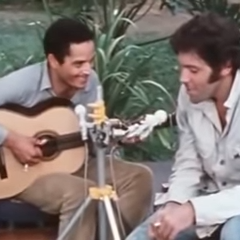The promise of a dolce vita on the beach, coconut in hand, embodied an irresistible alternative to urban monotony and the rapid industrial evolution in postwar European cities. What could help convey this sense of easy living and indolence better than the swing of bossa nova music?
Brazil and France have always shared mutual admiration, in a back and forth love affair, declaring passionately between each other, “Je t’aime... moi non plus” (“I love you – me neither”, for the Serge Gainsbourg/Jane Birkin song). We know that Pierre Barouh, who described himself as “France’s most Brazilian Frenchman”, was a close friend of Baden Powell and Vinicius de Moraes, who contributed to popularising bossa nova in France by adapting many of the hits into French – including the “Samba da Bênção”, which then became “Samba Saravah” for Claude Lelouch’s full-length movie A Man and a Woman. Earlier in 1957, Henri Salvador prefigured bossa nova by slowing down a bolero rhythm to which he added a few jazzy chords: “Dans mon île” (“On My Island”). The Frenchman, whom Gilberto Gil credited as the "bossa nova champion" after he passed away, is today recognized as one of the precursors of the genre by Brazilian inventor Antônio Carlos Jobim. In return, a few French chanson artists adapted numerous bossa nova classics, featured here in a selection that shows how much the language of Molière, though infamously considered harsh and complex, perfectly suits the Brazilian swing.
.png)




.jpg)
.jpg)